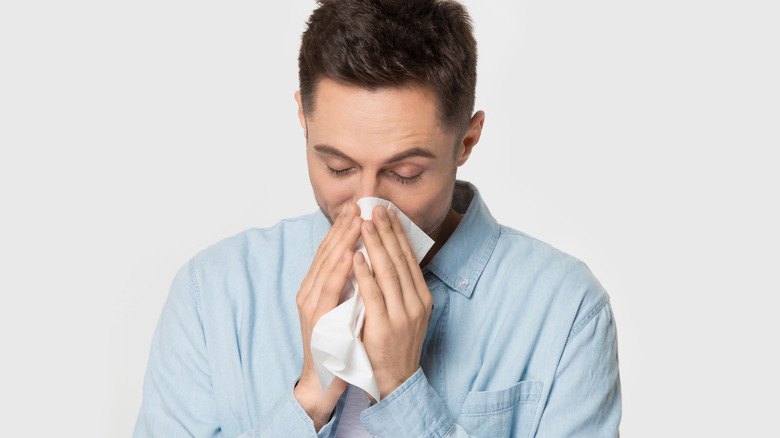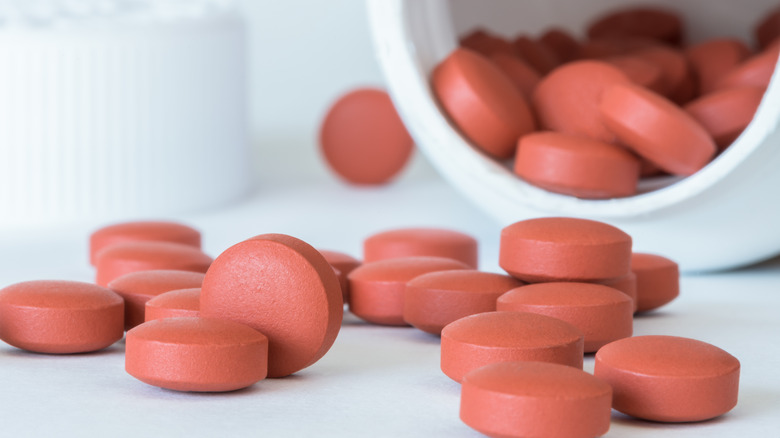Things You Should And Shouldn't Do When Getting Your Flu Shot
If you wish to avoid the flu this year and also prevent others from getting sick, we suggest heading to your doctor's office or the nearest pharmacy for a seasonal flu shot. During a recent flu season, an estimated 35 million people got the flu, with about half of them seeking medical care and 380,000 ending up in the hospital according to the Centers for Disease Control and Prevention (CDC).
According to WebMD, common flu symptoms include fever, headache, cough, runny nose, sore throat, body aches, and fatigue. And really, who has the time (or desire) for any of that? Plus, potential complications can involve bacterial pneumonia, dehydration, ear infections, and sinus infections, all of which can be life-threatening when left untreated. For anyone with long-term medical conditions like congestive heart failure, asthma, or diabetes, you should also be aware that getting the flu can make things even worse.
The CDC recommends flu vaccinations for almost everyone aged 6 months and older, particularly those at increased risk for complications such as young children, adults over 65, pregnant women, and people with underlying health issues. To help ensure that your vaccine goes as smoothly as possible this year, here are some things you should and shouldn't do when getting your flu shot.
Do: Get your flu shot in the fall
Although the severity of different flu seasons can vary, the best time to get your flu shot is always in the fall. This timing can help you build immunity before the flu begins to widely circulate. Peak flu activity generally occurs between December and February (per the CDC), and it can take about two weeks after vaccination for antibodies to fully develop in the body, according to the U.S. Food and Drug Administration (FDA).
Even if flu season has already arrived, you can still benefit from receiving a flu shot. Dr. Anthony Fauci, director of the National Institute of Allergy and Infectious Diseases, advised on CNN that "What you should do is get it as soon as you can and in the most expeditious manner." Although health experts are unclear exactly how COVID-19 will impact flu circulation going forward, some anticipate an early and severe flu season due to relaxed pandemic safety guidelines and reduced immunity after many months of avoiding close contact with others.
Don't: Skip the flu shot because you got one last year
It is necessary to receive a new flu vaccine every year. The Mayo Clinic explains, "Because flu viruses evolve so quickly, last year's vaccine may not protect you from this year's viruses. New flu vaccines are released every year to keep up with rapidly adapting flu viruses. When you get vaccinated, your immune system produces antibodies to protect you from the viruses included in the vaccine. But antibody levels may decline over time — another reason to get a flu shot every year." The 2021 flu shot, for instance, is specially designed to protect our population against four different types of influenza viruses that are expected to circulate.
Tired of getting jabbed every year? We get it. Ongoing research to develop a universal flu vaccine may save us the trouble of annual flu vaccination in the future (per GoodRx). Theoretically, this type of vaccine would protect you from current strains of flu, along with the future mutations.
Do: Choose your preferred arm
Although the flu shot will be just as effective when administered in either arm, many health experts advise using your non-dominant side to help avoid potential soreness afterwards (via UCLA Health). Dr. Juanita Mora, American Lung Association volunteer spokesperson and allergist/immunologist, explains why arm soreness can occur after vaccination: "The reason why your arm specifically is sore is that your immune system is giving you a robust response to the flu vaccination." In other words, a sore arm is the result of your body reacting to the vaccine (and not just the needle). Although considered safe, your body nevertheless perceives the vaccine as a threat and begins to build antibodies.
Some individuals may be advised to use their dominant side for their flu shot, or even another area of the body like the hip. For example, women who develop lymphedema after breast cancer surgery should avoid sticking needles into affected areas (according to Cure). If you're not sure which arm is best to use, talk to your doctor about your individual situation. Keep in mind that arm soreness after a flu shot is usually mild.
Don't: Think that you are too young or too healthy for a flu shot
Although some people are more at risk than others for getting the flu or developing flu complications, almost everyone can benefit from a seasonal flu shot (via CDC). As the FDA states, "An annual vaccination to prevent flu is the best way to reduce the risk of getting the flu and spreading it to others. When more people get vaccinated, it is less likely that the flu viruses will spread through a community."
Similar to other vaccines, it is important to understand that the flu shot is not 100% effective. While efficacy varies from year to year, it has been estimated to be around 50 to 60% in past reviews (per the Mayo Clinic). Even with that in mind, the flu shot is well worth receiving. If you do end up getting the flu after vaccination, you will likely avoid serious illness, complications, hospitalization, and even death. Plus, the flu vaccine can help keep others around you from getting sick, including vulnerable community members (via CDC).
Do: Drink enough water
You have probably already heard that you should drink lots of water before and after getting a flu shot. The Northshore University Health System agrees that this is a good idea: "Hydrated muscles aid in quicker recovery and take up the inoculant more efficiently than a dehydrated muscle." However, a recent article by NPR explains that while being well hydrated is a good idea for your health in general, there isn't much evidence to suggest that it reduces vaccine side effects or improves overall immune response.
That said, getting a vaccine while in a state of dehydration is a bad idea. For one thing, this can make it more likely that you'll feel faint or unwell afterwards. Another aspect to keep in mind is that some individuals develop a fever as a vaccine side effect. If you experience fever after receiving a flu vaccine, it is important to drink plenty of fluids.
Bottom line: While being properly hydrated for your flu vaccine is recommended, good hydration is always important to help regulate body temperature and allow your body to deliver essential nutrients to cells.
Don't: Tense your arm muscles when getting your flu shot
We all know that relaxing when someone is about to stick a needle in your arm can be challenging. But you should also be aware that muscle tension during a flu vaccine injection can result in more pain. Janet Li-Tall, a nurse with UCLA Health who has administered thousands of flu shots over the years, has a number of helpful suggestions for a less painful flu shot. She suggests letting your arm hang loose, explaining that "The needle is going into your muscle so tensing your arm can lead to more pain." Afterward, immediately massage the area and move around the arm. Another strategy, provided by Ochsner Health, is to loosen arm muscles by placing your hand on your hip and dropping that shoulder.
If you are nervous, it can also be helpful to let the person administering your vaccine know. They can help distract you by talking to you and asking questions, according to Li-Tall. If you are nervous because you have concerns about the vaccine's safety, efficacy, or potential side effects, they may also be able to set your mind at ease by providing relevant information.
Do: Consider the nasal spray to avoid needles
If you're avoiding the flu shot because you hate needles, we have good news: Healthy, non-pregnant individuals ages 2 to 49 can opt to receive their flu vaccine via a nasal spray called Flumist Quadrivalent. This vaccine contains a weakened, live virus that triggers an immune response in the nose, which is where most people get infected with the flu. It is administered with one spray in each nostril, during which you can breathe normally (there is no need to sniff).
According to WebMD, the nasal spray works as well as the flu shot in adults. In 2009, it was found to work even better in kids; however, those results were not repeated in later studies. Although a needleless vaccine certainly sounds appealing, some people should not get the nasal spray. They include kids under 2, adults 50 and over, pregnant women, anyone who has had an allergic reaction to a vaccine in the past, young kids with asthma, and those with a weakened immune system. If in doubt, consult your doctor.
Don't: Pre-medicate or take pain relievers for mild discomfort
Although you may be tempted to reach for that bottle of pain relievers before you even get your flu shot, it may be best to avoid pre-medicating or taking medication afterward for mild discomfort, unless approved by your doctor. Researchers at the University of Rochester Medical Center suggest that taking Advil or Aleve may dilute the "power of the vaccine" by impacting your body's ability to develop antibodies. One author on the study, David. J. Topham, says, "Unless your health care provider tells you otherwise, it's best not to take pain relievers one or two days before the flu vaccine and for a week afterward."
Other health providers apparently disagree. Elite Care Family Medicine explains that the most common flu vaccine side effect is an injection site reaction, followed by headache and muscle pain. To avoid these issues, they suggest taking ibuprofen or acetaminophen beforehand. Other health experts, including those at Total Wellness, recommend taking pain relievers for post-vaccine symptoms like swelling and pain.
When vaccine side effects develop, it is usually on the first day. Most go away within a day or two. If you are suffering but wish to avoid using pain relievers, talk to your doctor about the best course of action. One option may be to apply compresses to the injection site: Try cold ones for the first 1-2 days to reduce inflammation, then warm ones to relax the muscle and promote better blood flow.
Do: Exercise soon after your flu shot
It may be tempting to take it easy the day of your flu shot, but research shows that exercising soon afterward may increase your antibody response. In a small research study, kinesiology experts at Iowa State University discovered that individuals who rode a stationary bike for 90 minutes after getting the H1N1 flu shot nearly doubled their antibody response. Previously, the same researchers determined that moderate, long-term exercise (defined as 3 times a week for a year) can also increase antibody response. This effect was most noticeable six months after vaccination; in other words, those who exercise regularly may have better protection from flu than others later on in the flu season.
If you decide to head straight over to the gym after your flu jab, that's great. However, be careful not to overdo it. Michael Ison, professor of infectious diseases at Northwestern University Feinberg School of Medicine explained to Yahoo! that "Aggressive activity of the vaccinated area may increase the pain after the vaccine. Aerobic activity won't hurt, but arm weights might be best avoided for the first one or two days after getting the vaccine."
Don't: Baby your arm
Why does your arm hurt after a flu shot? It can be surprising, since the vaccine involves only a teeny tiny needle. Even though the needle is small, it does puncture both skin and muscle (typically, the deltoid), which can lead to inflammation (per Health). A sore arm after vaccination is also a sign of the immune system responding to a perceived threat — in this case, the vaccine. Vaccines that are administered directly into a muscle –– such as flu, COVID-19, and tetanus –– tend to cause more arm pain than other types of vaccines.
Whether your injection site is only slightly sore or feels as though you've been punched in the arm, one common reaction to a flu shot is to baby the affected area. Unfortunately, this behavior can actually make things worse. Keep in mind that your arm soreness is not the result of an injury, so there's really no need to protect it. Instead, Banner Health explains, "Moving your arm around after the shot will help spread the vaccination away from the injection site and increase blood flow." This action can help keep potential discomfort to a minimum; however, take care not to move it too much (i.e. lifting weights).
Do: Consider getting your flu and COVID vaccines at the same time
In case you missed it, COVID-19 booster shots are now recommended for all adults in the U.S. to protect against Omicron and additional variants (via CDC). Since both the flu and COVID-19 are expected to widely circulate this winter, now is the perfect time to get vaccinated. And yes, you can safely get them at the same time (per the CDC), whether you need an initial, second, or booster dose of the COVID-19 vaccine.
If you're concerned about doubling your vaccine side effects, you may actually be better off getting the two over and done with together (per USA Today). Although side effects from the flu shot and COVID-19 vaccine can vary from individual to individual, common symptoms like fever, body aches, and headache can be experienced just once if you get your vaccines on the same day instead of on two separate occasions.
However, you may end up with two sore arms at the same time. Some health experts are recommending the use of different arms when administering both vaccines at once (via OSF Healthcare). If you hate the thought of so many needle sticks, Moderna is developing a combination COVID-19 booster and flu shot, according to Verywell Health.
Don't: Assume that you can't get a flu shot because of an egg allergy
If you've been avoiding the flu shot because you have an egg allergy, this is probably unnecessary. According to the American Academy of Allergy, Asthma, & Immunology (AAAAI), "Recent studies have shown that even individuals with confirmed egg allergy can safely receive the flu vaccine." You may have noticed that in the past, health providers administering the vaccine asked about egg allergies. Now, they are no longer required to since it is considered safe.
Although the flu shot contains a low level of egg protein that is unlikely to cause problems, a reaction can still (very rarely) occur. The CDC reports a rate of anaphylaxis of 1.31 per one million vaccine doses administered. Some people with egg allergies may not want to take even this small risk. Fortunately, there are also two eggless versions of the flu shot available: Flublock Quadrivalent (for adults only) and Flucelvax Quadrivalent (for individuals aged 4 and older). If you have an egg allergy and are not sure what to do about the flu vaccine, talk to your doctor for personalized recommendations.
Do: Seek medical care if you have a reaction
Most reactions to the flu shot are mild. These can include symptoms like arm soreness, fever, headache, and muscle aches (via Prevention). According to a 2008 study in the Japanese Journal of Infectious Diseases, "The most frequent adverse reaction after vaccination was soreness at the injection site in 33.4%, followed by skin redness in 18.1%, myalgia in 17.7%, fatigue in 17%, and febrile sensation in 15.2%. After vaccination, such adverse reactions began within 24 [hours] in 70.6% of subjects."
Some individuals experience more severe reactions. You should call 911 if your mouth and throat are swollen, you are wheezing or having trouble breathing, you have chest pain or your heart is beating faster than normal for you, or you feel like you are going to faint (via Drugs). If your face is red and swollen, or you have hives that spread across your body, you should go to the emergency room. Finally, you should contact your doctor if you feel weak or dizzy, have increased pain, redness, or swelling around the injection site, or have additional questions or concerns about the flu shot.
Don't: Believe that getting a flu shot can give you the flu
There is no scientific evidence that the flu shot can give you the flu. However, this is a common misconception. The CDC clarifies: "Flu vaccines cannot cause flu illness. Flu vaccines given with a needle (i.e., flu shots) are made with either inactivated (killed) viruses, or with only a single protein from the flu virus. The nasal spray vaccine contains live viruses that are attenuated (weakened) so that they will not cause illness."
If you experience flu-like symptoms soon after receiving a flu vaccine, there are several possible explanations for why. First of all, your symptoms might actually be vaccine side effects, which usually occur within 24 hours and include fever, headache, and muscle aches (per Healthline). Alternatively, you may have been exposed to the flu prior to vaccination or before you've developed full immunity (which typically takes about two weeks), according to the CDC. Finally, you may have come down with another illness that has similar symptoms to flu, such as a bad cold or COVID-19.
If you believe you may have the flu, Mayo Clinic recommends isolating so that you don't get others sick, getting plenty of rest, and drinking lots of fluids. Over-the-counter pain relievers can help you manage some of the symptoms of the flu.















